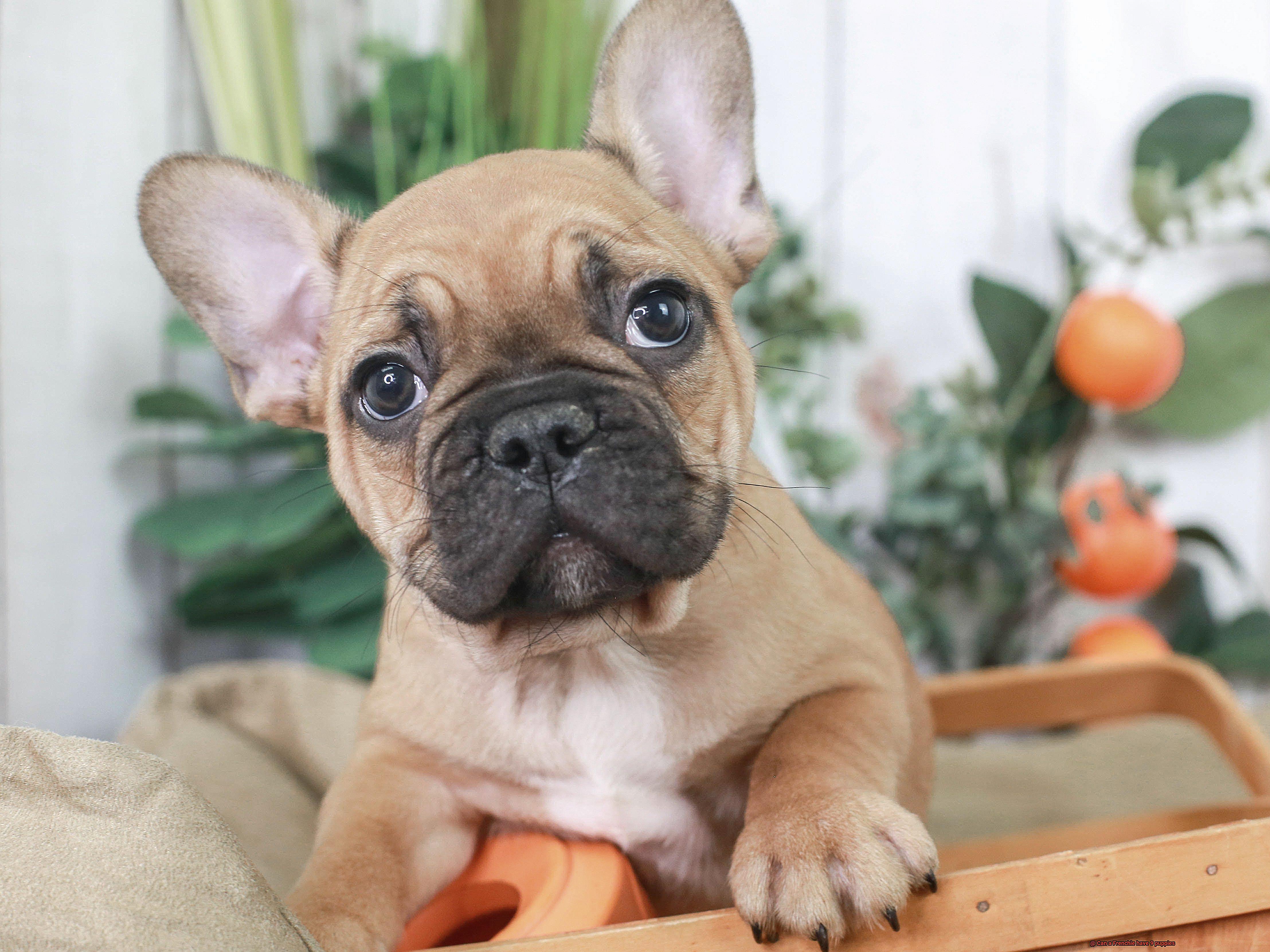Can a Frenchie have 9 puppies?
The French Bulldog, a breed that steals hearts with their wrinkled snouts and playful antics. If you’re a proud Frenchie owner or just a dog lover looking for some fascinating facts, you might have come across the rumor that these adorable pups always have litters of exactly nine puppies. But is there any truth to this claim? Let’s dive into the world of French Bulldogs and uncover the truth.
In the world of dog breeding, different breeds tend to have typical litter sizes. However, the idea that French Bulldogs consistently produce nine puppies is more of a myth than reality. While it’s true that some Frenchies may have larger litters, the notion that they always have a specific number seems too good to be true.
To shed light on this topic, we’ll explore various factors that can influence litter size in French Bulldogs. From genetics and breeding practices to the health and age of the mother, there are many variables at play.
So, grab your favorite drink, get comfortable, and join us as we separate fact from fiction and debunk the myth that French Bulldogs are destined to have precisely nine adorable fur babies.
The Average Size of a Frenchie Litter
Contents
- 1 The Average Size of a Frenchie Litter
- 2 Factors That Impact the Number of Puppies a Frenchie Can Have
- 3 Genetics: How Parentage Affects Litter Size
- 4 Age: How Mother’s Age Impacts Litter Size
- 5 Breeding Practices: Artificial Insemination and Hormone Therapy
- 6 Proper Care for Pre- and Postnatal Periods
- 7 Conclusion
The French Bulldog – a petite and lovable breed known for its adorable wrinkly face and bat-like ears. If you’re a proud Frenchie owner or considering adding one to your family, it’s essential to understand the average size of a Frenchie litter.
In this blog post, we’ll delve into the fascinating world of Frenchie litters, exploring their typical size and the potential risks and complications associated with larger litters.
Average Frenchie Litter Size:

When it comes to Frenchie litters, small is the name of the game. On average, a Frenchie mama gives birth to around 3 to 4 precious puppies. These little bundles of joy are enough to fill your heart with love and warmth.
However, it’s not unheard of for a Frenchie to surprise everyone with a slightly larger litter of up to 5 puppies. While rare, it’s not impossible. After all, Frenchies always seem to keep us on our toes.
Factors Influencing Litter Size:
Several factors come into play when determining the litter size of French Bulldogs. Genetics, age, health, and breeding practices all play a role in this intriguing puzzle. Let’s take a closer look at these factors:
- Genetics: The genetic makeup of the parents significantly influences the litter size. If both mom and dad come from lines with a history of larger litters, there’s a higher chance that your Frenchie will follow suit.
- Age: Just like humans, age can affect fertility in Frenchies too. Younger females tend to have smaller litters, while older ones may surprise you with a slightly larger brood.
- Health: A healthy momma equals healthy puppies. Underlying health issues or structural abnormalities can impact a Frenchie’s ability to conceive or carry a larger litter. Regular vet check-ups and proper care are crucial for a successful pregnancy.
- Breeding Practices: Breeders may use techniques like artificial insemination and hormone therapy to increase the chances of a larger litter. However, it’s important to consult with a reputable breeder or veterinarian before considering these methods.
Risks and Complications:
While larger litters may seem exciting, they can come with increased risks and challenges for both the mother and her puppies. Here are some potential issues associated with larger Frenchie litters:
- Birthing Difficulties: French Bulldogs have a unique body structure, which can make labor and delivery more challenging. With larger litters, there’s an increased risk of complications during the birthing process.
- Limited Milk Supply: A Frenchie momma may struggle to produce enough milk to nourish a larger number of puppies adequately. This can lead to nutritional deficiencies and slower growth in the litter.
Factors That Impact the Number of Puppies a Frenchie Can Have
If you own a Frenchie or are considering breeding them, it’s essential to understand the factors that can influence the number of puppies a female Frenchie can have. In this article, we will explore various factors, from age and health to genetics and breeding methods, that can impact litter size. So, let’s dive in.
Age and Health:
Just like with humans, age and health play a crucial role in determining the size of a Frenchie’s litter. Younger and healthier females tend to have larger litters compared to older or less healthy ones. So, ensure your female Frenchie is in optimal health before considering breeding.
Genetics:
The genetics of the parents also contribute significantly to litter size. If both parents come from lines with larger litters, there is a higher likelihood of the female producing more puppies. This is why it’s important to research the lineage of your Frenchie before breeding.
Breeding Method:
The method used for breeding can also impact litter size. Natural mating tends to result in smaller litters, while artificial insemination techniques can increase the chances of having larger litters. Discuss with your veterinarian which method is best for your Frenchie.
Timing of Breeding:
Breeding during the female’s heat cycle can increase the chances of conception, potentially leading to more puppies. It’s important to track your Frenchie’s heat cycle carefully and consult with a veterinarian on the optimal time for breeding.
Nutrition and Care:
Proper nutrition and care during pregnancy are vital for healthy and larger litters. Ensure your Frenchie receives a well-balanced diet, regular veterinary check-ups, and appropriate prenatal care to support her well-being and that of her puppies.
Conclusion:
While the average litter size for French Bulldogs ranges from 1 to 5 puppies, factors such as age, health, genetics, breeding method, timing of breeding, and proper nutrition and care during pregnancy can influence litter size. Remember that it’s essential to breed responsibly, considering the health and well-being of both the parents and potential offspring. Consulting with a veterinarian and experienced breeders will provide valuable guidance on breeding practices and expectations regarding litter size.
Genetics: How Parentage Affects Litter Size
When it comes to breeding French Bulldogs, the size of the litter can be influenced by a variety of factors, including genetics. In this section, we’ll dive deeper into how parentage affects litter size in these adorable pups.
The Role of Genetics

Just like with humans, genetics play a significant role in determining the number of puppies a Frenchie can have. The genetic makeup of both the mother and father contribute to the litter size. Some Frenchies may carry genes that predispose them to larger litters, while others may not.
Brachycephalic Skull Structure
French Bulldogs are known for their adorable short-nosed or brachycephalic skull structure. While this characteristic adds to their charm, it can also make mating and giving birth more challenging for the mother. The shape of their skull can affect the birthing process, potentially resulting in smaller litter sizes compared to other breeds.
Mother’s Age and Health
Another factor that affects litter size is the mother’s age and overall health. Older or unhealthy Frenchies may have smaller litters compared to younger, healthier ones. It’s essential to ensure that the mother is in optimal health before breeding to increase the chances of a larger litter.
Other Influencing Factors
While genetics is a significant factor, it’s important to note that it is not the sole determinant of litter size. Other factors such as nutrition, environment, and breeding practices can also influence litter size. Providing proper nutrition and a suitable environment for the mother during pregnancy can positively impact litter size.
Responsible Breeding Practices
Breeding French Bulldogs should always be done responsibly, taking into consideration the health and well-being of both the mother and puppies. Consulting with a veterinarian or a professional breeder who specializes in French Bulldogs can provide more specific information about expected litter sizes for this breed.
Age: How Mother’s Age Impacts Litter Size
In this blog post, we will dive into the topic and share valuable insights based on research and first-hand experiences. So, let’s explore the impact of age on litter size in French Bulldogs.
Sexual Maturity and Breeding Age:
French Bulldogs typically reach sexual maturity between six and nine months of age. However, it is crucial to wait until your Frenchie is at least two years old before breeding her. This allows her body to fully develop physically and mentally, ensuring a healthier pregnancy and potentially larger litter.
First-Time Mothers:
When a Frenchie is bred for the first time, her litter size is usually smaller than subsequent pregnancies. This is because her reproductive system is still maturing, and her body may not be fully prepared to support a larger litter. On average, first-time Frenchie mothers can expect three to four puppies.
Decline in Litter Size with Age:
As a Frenchie ages, her litter size tends to decrease. This decline can be attributed to factors such as reduced fertility, hormonal changes, and decreased egg quality. Typically, Frenchies over the age of five or six may have smaller litters, with an average of two to three puppies.
Individual Variations:
It’s important to remember that every Frenchie is unique, and there can be exceptions to these general trends. Some older Frenchies may still have larger litters, while some younger ones may have smaller litters. Other factors like genetics, overall health, and individual variations can also influence litter size.
Maximizing Litter Size:
To maximize the chances of having a larger litter, breed your Frenchie during her prime reproductive years, which is usually between two and five years old. During this time, her eggs are healthier, increasing the likelihood of conceiving a larger number of puppies.
Additionally, providing proper pre-breeding care, including regular veterinary check-ups, a balanced diet, and sufficient exercise, can contribute to a healthier pregnancy and potentially larger litter size.
Breeding Practices: Artificial Insemination and Hormone Therapy
Breeding Practices: Artificial Insemination and Hormone Therapy for French Bulldogs
If you’re a French Bulldog owner interested in breeding your furry friend, you may have come across the terms artificial insemination (AI) and hormone therapy. These breeding practices can be valuable tools when it comes to ensuring a successful and safe breeding process. Let’s take a closer look at how they relate to French Bulldogs.
Artificial Insemination: A Safe and Convenient Option
Artificial insemination involves collecting semen from a male dog and using it to inseminate a female dog. This method is commonly used in cases where natural mating is not possible, such as when the male or female dog has physical limitations. Additionally, AI can be used to breed dogs that are in different geographical locations, making it a convenient option for breeders.
There are different methods of AI, including vaginal insemination or transcervical insemination. Vaginal insemination involves depositing the semen directly into the female’s vagina, while transcervical insemination involves passing a catheter through the cervix to reach the uterus. The choice of method depends on various factors, including the experience and preference of the breeder or veterinarian.
Hormone Therapy: Optimizing Timing for Success
Hormone therapy is often used in conjunction with artificial insemination to increase the chances of a successful pregnancy. By administering hormones to the female dog, breeders can regulate her reproductive cycle and optimize the timing of insemination.
One common hormone used in breeding practices is progesterone. Progesterone levels play a crucial role in determining the optimal time for insemination. By monitoring progesterone levels through blood tests or vaginal cytology, breeders can determine when the female dog is most fertile and ready for insemination.
Another hormone commonly used is luteinizing hormone (LH). LH surge indicates the onset of ovulation, which is the ideal time for insemination. Monitoring LH levels through blood tests or urine tests can help determine the best timing for insemination.
Expertise and Safety
It’s important to note that both artificial insemination and hormone therapy require expertise and should be performed by experienced professionals, such as veterinarians or reproductive specialists. These professionals have the knowledge and skills to ensure that all procedures are done safely and hygienically, minimizing the risk of infections or complications.
No Guarantees, But Increased Chances
While artificial insemination and hormone therapy can increase the chances of a successful pregnancy, it’s important to understand that they are not guaranteed methods. Other factors, such as the overall health and fertility of the dogs involved, also play a significant role in determining the success of breeding.
Proper Care for Pre- and Postnatal Periods
Today, we are going to dive into the world of pre- and postnatal care for our adorable Frenchie moms and their precious puppies. Being a responsible breeder or owner means understanding the unique needs of these amazing dogs during this important period. So, let’s get started.
Pre-Natal Care:
- Veterinary Check-ups: Regular visits to the vet before breeding are essential to ensure the mother’s good health.
- Balanced Diet: Consult with a veterinarian to determine the right diet for your pregnant Frenchie. Feeding small, frequent meals throughout the day is recommended.
- Moderate Exercise: While strenuous activities should be avoided, short walks or gentle play sessions can help maintain muscle tone.
Preparing for Birth:

- Whelping Area: Create a designated whelping area with clean bedding and sufficient warmth.
- Whelping Box: Provide a safe space for the mother and puppies, allowing easy access for monitoring and assistance if needed.
Postnatal Care:
- Monitoring the Mother: Keep a close eye on her health and provide a quiet space for rest and relaxation.
- Veterinary Check-ups: Regular check-ups are crucial for both the mother and her puppies’ well-being.
- Diet and Hydration: Feed the mother a high-quality diet during lactation, ensuring she stays hydrated with fresh water at all times.
Caring for the Puppies:
- Growth Monitoring: Regular weighing helps ensure proper weight gain.
- Clean Environment: Provide a clean and warm space for the puppies to thrive.
- Socialization and Stimulation: Early socialization and gentle stimulation promote their overall well-being.
Conclusion
In conclusion, it is indeed possible for a Frenchie to have 9 puppies. While the average litter size for French Bulldogs tends to be around 3-5 puppies, there have been cases where these adorable canines have given birth to larger litters. It is important to note that the size of a Frenchie’s litter can vary depending on factors such as genetics, health, and breeding practices.
Breeding French Bulldogs should always be done responsibly and with the utmost care for the well-being of both the mother and her puppies. This includes ensuring that the mother dog is in good health before breeding, providing proper nutrition and prenatal care, and having regular check-ups with a veterinarian throughout the pregnancy.
While it may be exciting to have a larger litter of puppies, it also means more responsibility and resources needed to properly care for each puppy. From providing enough space for them to grow and play to ensuring they receive proper socialization and veterinary care, raising a litter of 9 puppies requires dedication and commitment.
So yes, while it is not common, a Frenchie can indeed have 9 puppies. It is essential for breeders and owners alike to understand the implications of such large litters and be prepared to provide the necessary care and attention required.




